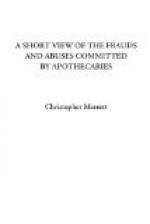they will not distil Strong-waters, &c. (an easie
thing for them to undertake) and by this means to
ruine the Corporation of Distillers of Strong-waters,
I leave to the said Company to conceive as they please.
However, this I have heard several of them say, that
they resolve to buy all sorts of Drugs, and make a
Magazine of them, as well as of the greater Compositions,
at their own Hall; and to sell them to the Members
of their Company, whereby the Trade of the Druggist,
must be much lessened, if not totally over-thrown.
So little regard have they of any other employment
but of their own, yet all these things they may do
without any offence against the Laws of the Land.
Why then should they, who have so many ways of subsistence,
envy, and usurp unlawfully over the single and lawful
way granted Physicians for their livelihood?
Or why would they repine, and revile them for advancing
their Art, the publick health and profit, and for maintaining
their profession by their Pens, and actings against
themselves, who are the first aggressors in this division?
Which I profess to be the sole end of these present
papers, and heartily wish they may thrive and prosper
as long as they conform themselves to the Laws of Honesty,
Reason, and of the Land. Besides, why may not
the Plaisterer more reasonably pretend the same to
the Painter, and many other Trades against one another,
as the Brick-layer to the Stone-Cutter, &c. that they
understand the Trade, and that truly too, and that
they cannot subsist without this incroachment?
And why should not Chirurgeons keep open Apothecaries
Shops? but that the same Law limits those Tradesmen,
as well as prohibits the Apothecary from the practice
of Physic. And surely the Law and State have
no consideration of those persons subsistence, who
conform not to them; and why should we have of those,
subordinate to us, who against all good Conscience
take away from us all that is our due, and continually
traduce and slander us very untruly and designingly?
The last objection (and a strange one) is, that in
this private way of giving Medicines, Physicians may
poyson their Patients. But this is easily retorted
upon the Apothecaries, who may themselves or their
Servants do the like, as ’tis known in the poysoning
of Sir Thomas Overbury; besides, since it cannot be
otherwise, but that the Patient must trust somebody,
’tis better to trust one then many; and if one,
better him whose education will teach him better Morality,
(and who hath given his Faith (equivalent to an Oath)
twice to the Body of the College; viz. once at
his admission as Candidate, and a second time at his
admission as Fellow; whereby he promiseth in these
words, That he shall give nothing to cause miscarriage,
or to destroy, or hinder Conception, nor Poysons (for
of such, good Medicines may be made) to an evil purpose,
nay that he shall not even teach them where there is
any suspicion of ill using of them. Which promise
is nothing else but the Oath proposed by Hippoc. to




